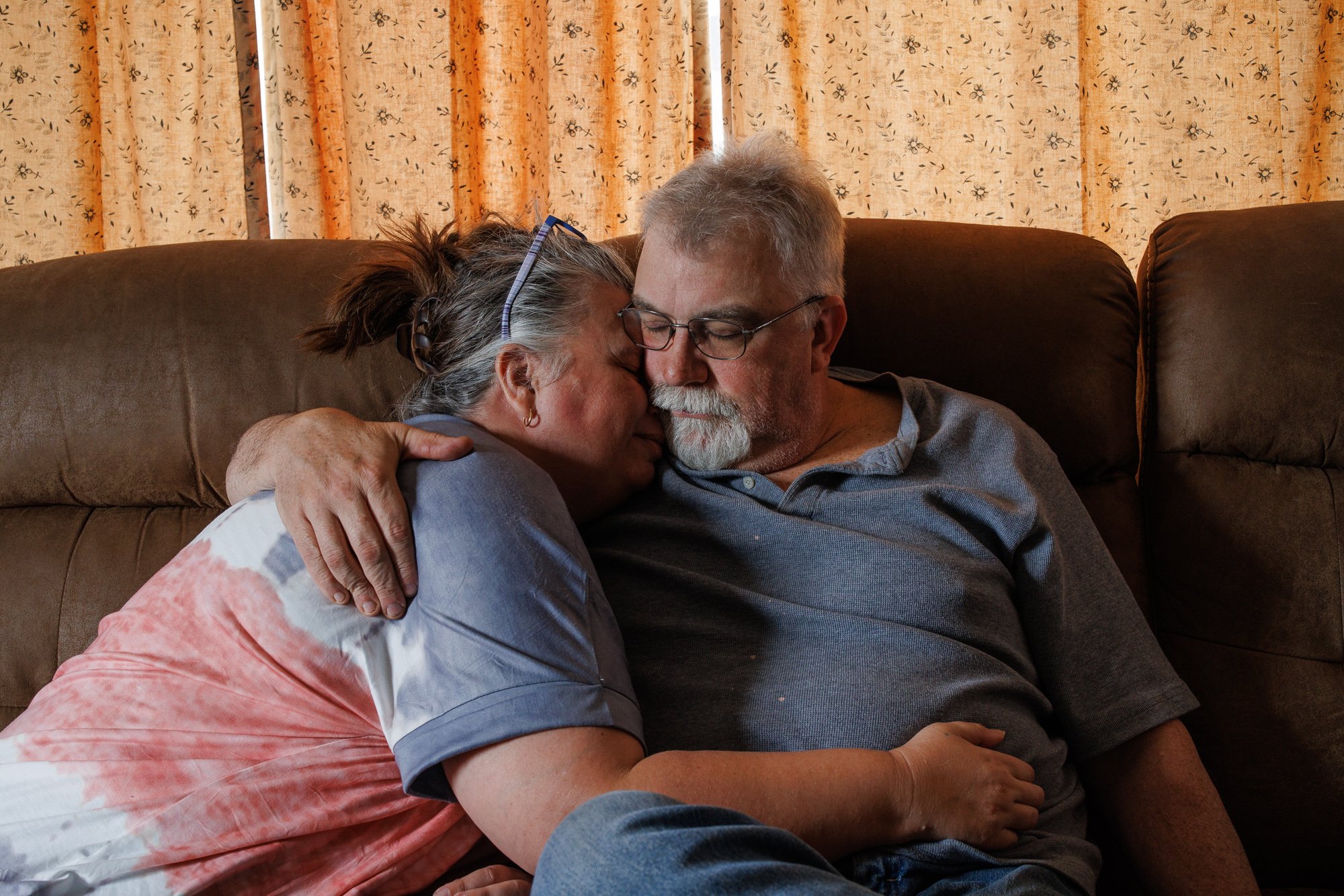A long exposure photograph shows EQT's Sizemore Well Pad in Knob Fork, West Virginia on February 17, 2024. The Sizemore Well Pad rests near the homes of four families who abandoned their homes after experiencing three years on ongoing illness consistent with exposure to chemical compounds released by EQT's hydraulic fracturing operations. The Sizemore Well Pad is at the center of a U.S. Environmental Protection Agency Clean Air Act investigation into the company and its emissions across northern Appalachia.
Pittsburgh gas giant EQT is America's largest producer of fracked natural gas. Amid a global rush to decarbonize, the company's CEO, Toby Rice, touts EQT's gas exports as “the largest green initiative on the planet.” But among the rural communities in northern Appalachia where the company operates, the realities of gas extraction hit home.
Four families living in one rural hollow in Knob Fork, West Virginia, pleaded for help for years after EQT expanded its natural gas fracking operations next door, and they began to notice odd chemical smells and deteriorating health. For eleven family members, urine testing showed unusually high levels of volatile organic compounds, and all experienced the same symptoms which are consistent with exposure to the compounds emitted from the company's operations— phantom stings, migraines, extreme lethargy, mysterious rashes and respiratory and neurological problems. The company, state regulators, lawyers and the United States Environmental Protection Agency did little to stem the fumes. Last year the families moved out, one by one, abandoning longtime homes and rural identities. The families claim that the corporation has poisoned and displaced them from their homes.
Across state borders in a tiny hamlet called New Freeport, Pennsylvania, residents say EQT is responsible for contaminating the local water supply after a 2022 fracking accident. Residents have been unable to use their water and have reported painful rashes after showering and oily, chemical-laden water. The company denied any responsibility and argued to regulators that the accident never happened.
Meanwhile, in August of 2023 EQT completed a $5.2 billion acquisition of land leases and infrastructure that, according to Rice, will allow the corporation to expand operations in the area and maintain production for the next four decades. EQT has been the main backer of the Mountain Valley Pipeline and ARCH2 hydrogen hub, and EQT has embarked on a vigorous public advocacy campaign to convince lawmakers and the public to support American exports of liquified natural gas, or LNG.
Read the story Hollowed Out, part of the investigative reporting project EQT’s Gas Play, by Quinn Glabicki and PublicSource.
Trina Hollabaugh rests while packing her belongings at the home she and her family abandoned after EQT began to extract natural gas in the rural hollow where they lived in Knob Fork, West Virginia, on November 20, 2023. The Hollabaugh’s and three other families abandoned their homes in Knob Fork after experiencing years of symptoms consistent with exposure to airborne volatile organic compounds, the same chemicals released by EQT's operations next door.
Abby Tennant’s journal, photographed on February 16, 2024, details her family’s symptoms and experiences during a week of late July, 2022, while living in Knob Fork, West Virginia, as EQT extracted natural gas nearby from the Marcellus Shale. Tennant documented three years of symptoms including neurological and respiratory problems, extreme lethargy and anxiety, phantom stings and chest pains. Tennant chronicled her own efforts to alert state and federal regulators to the problems in Knob Fork, which largely went unheeded.
Garrett Hollabaugh, 15, takes the stairs toward his bedroom at the family’s house in the hollow in Knob Fork on November 20, 2023. Like many of the family members, Garrett reported brain fog, chest pain, shortness of breath, anxiety and extreme lethargy. Hollabaugh was diagnosed with connective tissue disorder in 2024 and has since been hospitalized four times for a collapsed lung. He has also been diagnosed with joint issues, scoliosis, nodules on his thyroid, anxiety, depression and anemia. In August 2025, Hollabaugh and three other children who lived in Knob Fork sued EQT in federal court, alleging that the company knowingly exposed the children and their families to “hazardous, carcinogenic and radioactive pollutants, sickening them and forcing them to leave their childhood homes.”
Abby and Scott Tennant place their belongings into trash bags at the home they abandoned in Knob Fork, West Virginia, on February 17, 2024. Abby Tennant had hand-painted the ivy on the walls, and Scott had built the driveway with his own hands. The family abandoned the home and most of their personal belongings and moved miles away to escape the chemical emissions and illnesses they experienced for years after EQT began hydraulic fracturing operations next door.
Dolls belonging to Piper Tennant, 11, rest outside the house where the family relocated in Paden City, West Virginia, on February 16, 2024. The family sealed many of their belongings in plastic to avoid exposure to volatile organic compounds that may have contaminated them.
EQT President and Chief Executive Officer, Toby Rice (on right in checkered shirt), is confronted by residents of New Freeport, Pennsylvania on August 24, 2023 in Waynesburg, Pennsylvania. After a 2022 hydraulic fracturing accident, residents of New Freeport reported contaminated water, including painful red rashes after showering and oily, chemical-smelling water. The company and Rice have denied responsibility, arguing to regulators that the incident never occurred. A class-action lawsuit is pending in federal court. After residents confronted Rice, the company supplied some residents with large tanks of water, refilled weekly.
Tom Bussoletti stands next to the abandoned gas well in the forest near his home which was percolating “like a coffee pot” with methane, less than a mile from EQT’s Lumber pad site on the outskirts of New Freeport, Pennsylvania, on July 18, 2022.
Michael Durdevich stands beneath a water tank installed by EQT contractors at his home on the outskirts of New Freeport, Pennsylvania, on May 11, 2024. Residents of New Freeport, including Durdevich, reported water contamination, red painful rashes and chemical odors after an EQT hydraulic fracturing accident in 2022.
Jozlyn Kennedy, 11, puts on an angel costume while sorting belongings at the family’s abandoned log home in Knob Fork on February 17, 2024. “I felt like a ghost,” she remembered of her time living there.
Main Street in New Freeport, Pennsylvania, on May 9, 2024. New Freeport is the site of a 2022 hydraulic fracturing accident by EQT Corporation, which residents say contaminated local water supplies, and which has led to a class action lawsuit pending in federal court.
Greg Hollabaugh hunches over a tree to catch his breath in the woods above the cabin where his family relocated after experiencing years of illness after EQT began to extract natural gas next door, in Knob Fork, West Virginia, on November 20, 2023. “Didn’t used to be like this before they put the wells in,” he said. Hollabaugh experienced symptoms consistent with exposure to airborne volatile organic compounds, including chest pain, shortness of breath, anxiety, rashes and extreme lethargy.
Abby and Scott Tennant embrace at the house where the family relocated in Paden City, West Virginia, on February 16, 2024.












